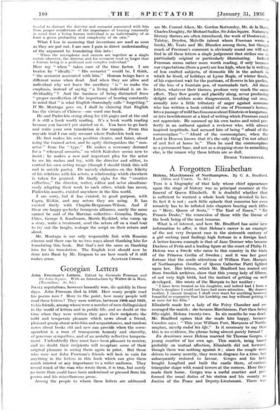Georgian Letters
John Freeman's Letters. Edited by Gertrude Freeman and Sir John Squire. With an Introduction by Walter de in Mare. (Macmillan. 8s. 6d.) SMALL reputations, however honestly won, die quickly in these days. John Freeman died in 1929. How many people read his poems now ? More to the point, how many people will read these letters? They were written, between 1906 and 1929, to his friends, among whorti'were a number of men distinguished in the world of letters and in public life, and no doubt at the time when they were written they gave their recipients the mild and temperate pleasure which news about a friend, pleasant gossip about activities and acquaintances, and random notes about books old and new can provide when the corre- spondent is a man of transparent honesty and sincerity, of generous sympathies, and of an amiably reflective tempera- ment. Undoubtedly they must have been pleasant to receive, and no doubt their recipients will recapture some of their original pleasure in seeing them again in print. But those who were not John Freeman's friends will look in vain for anything in the letters in this book which can give them much interest or any importance to a wider audience. They reveal much of the man who wrote them, it is true, but surely no more than could have been understood or guessed from hiS poems and his miscellaneous prose.
Among the people to whom these letters are addressed
are Mr. Conrad Aiken, Mr. Gordon Bottomley, Mr. de la Mare, Charles Doughty, Sir Michael Sadler, Sir John Squire. Naturally literary themes are often introduced, the work of Dostoevsky, Tolitty, Dryden, Melville (about whom Freeman wrote a book),. Mr. Yeats and Mi. Blunden among them, but though much of Freeman's comment is obviously sound one will not find in all these letters a single judgement that strikes one as particularly original or particularly illuminating. Indeed Freeman seems rather more worth reading, if only because our expectations (from a poet) are less high, when he is writing of less exalted subjects, of domestic life in the suburb in which he lived, of holidays at Lyme Regis, of winter floods, of his expectant wait for the postman, of flowers in his garden, of the loss of a fountain pen, of marmalade tart. All these letters, whatever their themes, produee very much the same effect. They flow gently and placidly along, never prodtleing delight mid seldom acute disagreement, breaking out Occa- sionally into a little tributary of anger againit someone who has written a book critical of one of Freeman's heroes, into a passage of mild facetiousness about Einstein or kangaroos, or into bewilderment at a kind of writing which Freeman could not appreciate. He summed up his own tastes and mind per- fectly in an outburst against a reviewer who, with almost inspired ineptitude, had accused him of being " afraid of the commonplace "—" Afraid of the commonplace, when the Lord in Heaven knows that it's the only thing rni not afraid of and feel at home in." Then he used the commonplace as a permanent base, and not as a stepping-stone to something - else, is the reason why these letters are so dull.
DEREK VERSCHOYLE.










































 Previous page
Previous page